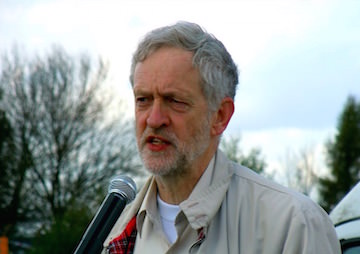Jeremy Corbyn Set to Become Leader of the U.K.’s Labour Party, Against Huge Odds
Long marginalized by his party’s establishment, the unlikely outsider is set to usher in a return to Labour’s more radical values.

Jeremy Corbyn speaking at an anti-drones rally in 2013. (stopwar.org.uk / CC BY-SA 3.0)
Until very recently, not even the most astute commentator could have predicted that Jeremy Corbyn would become the favorite in the U.K. Labour Party leadership contest. A member of Parliament for Islington North in London, Corbyn has spent 32 years in politics out of the spotlight in favor of leftist causes, from Latin American socialism to opposing austerity measures.
Corbyn has voted against his own party leadership over 500 times and has had the lowest expenses of any M.P., and because of his unwillingness to toe the line on New Labour policy, Corbyn has long been marginalized by his party’s establishment.
But now, the candidate once given odds of 100-1 is now the favorite to lead the party. In doing so, he is set to usher in a return to Labour’s more radical values.
The Guardian reports:
Corbyn’s vision is for Labour to campaign for a radical upheaval of the economic system, not be a softer “Tory-lite” party which also commits to spending cuts. His economic commitments are popular with the young, he has promised to bring the railways into public ownership and abolish university tuition fees. He champions “People’s Quantitive Easing”, which would allow the Bank of England to print money for housing projects, energy, infrastructure and digital development. …
As a fervent anti-war and pro-Palestinian activist, Corbyn has attracted the most stringent criticism for his foreign policy, with the Conservative chancellor, George Osborne, going so far as to call him a “national security threat”. He opposes the funding of Britain’s Trident nuclear missile system and has previously indicated he would favour leaving Nato, or even the European Union, though he has played down both those ideas during the campaign.
Voting for the next Labour leader closed Thursday, and the result will be announced Saturday. Despite a lukewarm start, when only 15 members of Parliament lent him their nominations, his campaign was boosted when he won the support of two of Britain’s biggest trade unions, Unite and Unison, and became the only candidate to vote against the Conservatives’ welfare bill while the others abstained. His campaign has also been aided by an increase in new members and supporters who paid £3 (approximately $5) to take part in the vote, which lead to a near-tripling of those eligible to vote to around 550,000 people.
–Posted by Roisin Davis
Independent journalism is under threat and overshadowed by heavily funded mainstream media.
You can help level the playing field. Become a member.
Your tax-deductible contribution keeps us digging beneath the headlines to give you thought-provoking, investigative reporting and analysis that unearths what's really happening- without compromise.
Give today to support our courageous, independent journalists.






You need to be a supporter to comment.
There are currently no responses to this article.
Be the first to respond.